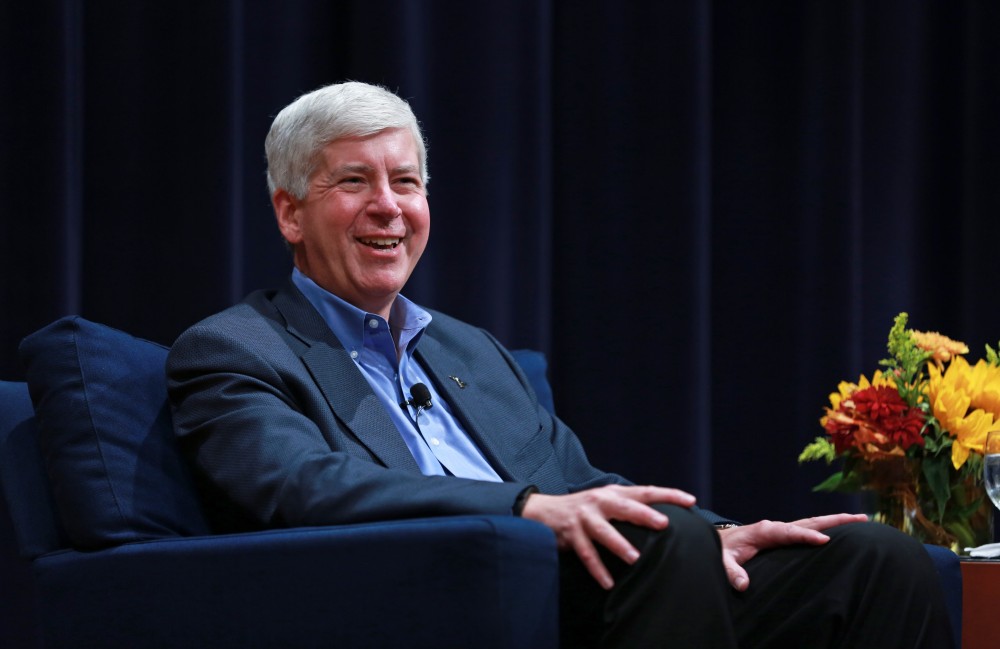Gov. Synder speaks at State University Summit

GVL / Kevin Sielaff – Michigan Gov. Rick Snyder visits Grand Rapids Oct. 7 for the 2015 State University Summit. Gov. Snyder was greeted by officials working within higher education institutions from across Michigan.
Oct 8, 2015
Michigan Gov. Rick Snyder spoke at the State University Summit on Oct. 7 at the Charles W. Loosemore Auditorium on the Grand Valley State University Pew Campus. The summit was comprised mostly of presidents and their board of trustees from all 15 public universities in the state.
Snyder gave a gubernatorial address at 9 a.m. before the summit started and then gave closing comments at 1:35 p.m. to wrap up the day. His closing comments were directed at answering questions the leaders at the summit had thought of throughout the day.
One of the main issues Snyder focused on related to the budget cuts that happened four years ago. In 2011, 15 percent of funding was taken away from higher education. Metric-based funding has been the primary reinvestment funding since then.
“Every single year I’ve done the budget, in the last slide of the budget presentation, I talk about the need to reinvest in universities,” Snyder said. “My goal is to get funding restored in terms of what was part of that cut. It would likely go through the formula because I believe in metrics.”
Another question voiced concern of there being too much emphasis on trade schools and that it might not reflect the importance of obtaining a four-year degree or higher.
“There is a need for additional training beyond high school to be successful,” Snyder said. “My goal is to help people become career-connected. I will put an emphasis on some kind of trade and background, but not too much. It’s a balancing act.”
Snyder also emphasized to everyone sitting in the audience that they are the ones who have the power; they need to assert their leadership role.
“There is always a critical role for critical thinking in the liberal arts,” he said to the leaders. “I think there’s a whole lot more universities could do to engage with high schools and with the students there because then you’re creating a pipeline right to where you’re going. You have to do it together. Your diversity is a positive power, but you need to come and speak with one voice.”
During a one-on-one interview with the Lanthorn, Snyder and his staff helped provide some insight on particular issues concerning GVSU, including funding, campus safety and sexual assault.
Dave Murray, Snyder’s deputy press secretary, explained Snyder’s idea to create a website where students could access information about career choices and financial information for those careers and different fields within them. Murray also said that Snyder hopes the Michigan universities begin to work together and not so independently. Snyder emphasized helping students in high school make an informed choice before getting to college.
Snyder also has another, long-term part of this process. He hopes to give students a better probability of successfully finding a career in their field of choice.
He wants to start giving this information to students before they graduate, perhaps even during high school so they can start thinking about it earlier. He noted that it would be helpful to students so they can decide what major they want to study and why.
Snyder addressed the unequal funding GVSU receives compared to the other public universities. GVSU has the second-lowest state appropriation per student in the state of Michigan. According to the GVSU 2014-15 Accountability Report, the university only receives $2,835 per student while Wayne State, the highest school on the list in regard to state appropriation, gets $8,176 per student. Theoretically, the appropriations are based off of four performance-funding measurements: six-year graduation rate, total number of degrees, administrative efficiency, and total number of Pell grant students. Based off of these metrics, GVSU ranks second-highest in the state but receives the second lowest amount of funding per student.
“If you go back in time, a lot of these decisions weren’t necessarily based on metrics. There’s a lot of politics that went on for decades,” he said. “So what we’ve been trying to do is to say ‘let’s not make it political anymore, let’s actually make it based on merit.’”
Another problem facing Michigan universities is campus sexual assault. One-fifth of public universities in Michigan are currently under federal Title IX investigations. These universities are the University of Michigan, Michigan State University and GVSU. Snyder noted that this is a critically important issue, and that the state needs to do more to address it.
“Last year we were able to get more resources in terms of budget resources to actually create a grant program,” he said. “(It) allows for more innovative approaches and more aggressive approaches to take on this issue.”
In the wake of the Oregon shooting last week, Snyder also commented on campus safety. He hopes his efforts will help keep Michigan students safe.
“We launched something called “OK to Say,” which is basically a hotline system that has been helpful in helping prevent instances or problems,” he said. “It’s an anonymous hotline where anyone can call in to say they’ve identified someone that they believe could be a potential threat or problem in terms of violence in our schools in some fashion.”
Another measure Snyder took last year to promote campus safety was creating mental health commission. He hopes the state will be proactive in helping people be more open about mental health issues and getting treatment.

























